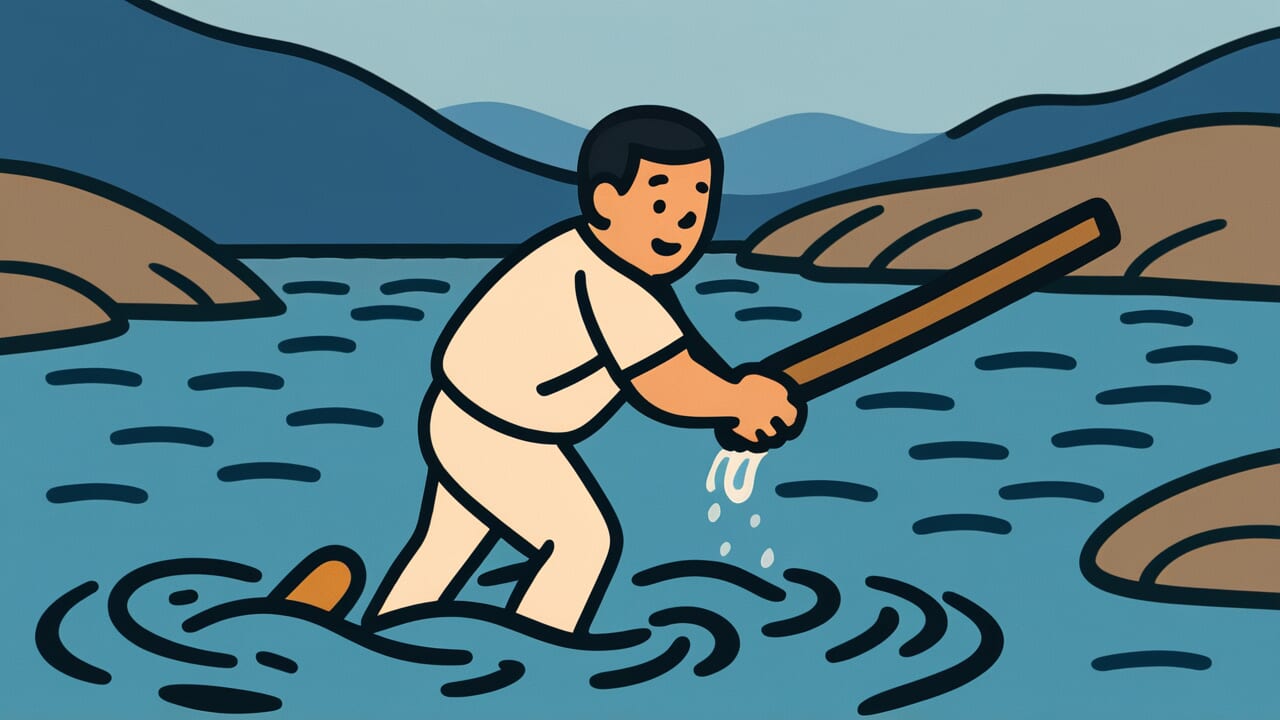How to Read “Striking a flowing river with a stick”
Nagaregawa wo bō de utsu
Meaning of “Striking a flowing river with a stick”
“Striking a flowing river with a stick” describes meaningless effort that produces no results, no matter how much work you put in.
This proverb describes situations where your effort is fundamentally misdirected. When you strike a flowing river with a stick, you might create a splash for a moment.
But the river’s flow itself doesn’t change at all. Similarly, if you only deal with surface problems without addressing the root cause, the situation never improves.
People use this expression to point out wasted effort. It applies when someone keeps trying temporary fixes without tackling the underlying problem.
In modern life, this fits situations where you work hard but see no results. You put in effort but nothing changes.
This proverb teaches us that what matters isn’t how much effort you make. What matters is whether you’re directing that effort in the right direction.
Origin and Etymology
No clear written records explain where this proverb came from. However, we can learn interesting things by looking at how the phrase is built.
“Nagaregawa” means a river that flows continuously. River water is always moving. It never stays the same for even a moment.
The ancient Greek philosopher Heraclitus said you can’t step in the same river twice. The essence of flowing water is change itself.
Now imagine striking such a flowing river with a stick. The moment your stick hits the water, the surface might get disturbed.
But the next moment, new water flows in. Everything returns to normal as if nothing happened.
No matter how hard you strike, no matter how many times you repeat it, you can’t affect the river’s flow at all.
This expression likely came from Japanese people living close to rivers for centuries. They observed rivers deeply.
Rivers were essential for farming and daily life. By watching rivers, people felt nature’s laws that humans cannot control.
They connected this natural truth to human activities. That’s probably how this proverb was born.
Usage Examples
- Adding more staff while keeping old methods instead of introducing a new system is like striking a flowing river with a stick
- Taking supplements without changing your basic lifestyle habits is just striking a flowing river with a stick—it won’t make you healthy
Universal Wisdom
The proverb “Striking a flowing river with a stick” contains wisdom about a fundamental human weakness and how to overcome it.
Everyone feels the urge to “do something” when facing a problem. We can’t just sit still.
We try to gain comfort by taking action, any action. But calmly judging whether that action is truly effective is actually very difficult.
Why do people keep making useless efforts? Because taking action itself creates the satisfaction of “trying hard.”
Striking a river with a stick does make you tired. You do work up a sweat. That’s why you can feel like you’re working hard.
But without results, this is just self-deception.
This proverb has been passed down for so long because humans are fundamentally weak against “the feeling of doing something.” What we truly need is the courage to stop and think.
Is what I’m doing now really meaningful? Is there a more effective method?
Asking yourself these questions is much harder than just keeping busy. And it’s much more important.
Our ancestors saw through this human nature. Perhaps they left us this proverb as a warning.
When AI Hears This
Striking a river’s flow with a stick is futile because energy dissipates overwhelmingly fast. In fluid dynamics, turbulent water like a river shows Reynolds numbers in the tens of thousands to hundreds of thousands.
This means the water’s inertial force far exceeds its viscous force. Water molecules collide with each other and convert kinetic energy to heat extremely quickly.
Calculating specifically, the localized kinetic energy generated when you strike with a stick diffuses into surrounding water in just 0.1 to 1 second. It converts to thermal energy.
Even if you input 1 kilojoule of energy, that’s less than one millionth of the kinetic energy the entire river flow possesses (several megajoules to gigajoules).
Moreover, that tiny energy instantly breaks down through turbulent vortex chains. It ultimately becomes just enough heat to raise the water temperature by about 0.0001 degrees.
What’s more important is that river flow is an open system continuously supplied with gravitational potential energy. Striking with a stick is momentary input.
But the river continuously receives energy from upstream. A single force cannot counter a continuous supply system.
This structural asymmetry exists. It shows the fundamental difference between closed and open systems.
Lessons for Today
This proverb teaches modern people that “being busy” and “producing results” are two different things.
In modern society, there’s a tendency to feel anxious unless you’re constantly doing something. We keep updating social media, hold meeting after meeting, and reply to emails instantly.
But many of these activities might be like striking a flowing river with a stick.
What’s important is developing the habit of regularly stopping to review your actions. Does what you’re doing now truly connect to achieving your goals?
Is there a more effective method? Taking time to ask these questions is actually the most productive time you can spend.
If you’re working on something now but not seeing results, maybe you’re not lacking effort. Maybe your effort is just pointed in the wrong direction.
Sometimes you need the courage to change direction. Stopping to think is far more constructive than continuing useless effort.
This proverb teaches us not just to seek efficiency. It teaches the importance of giving meaning to our actions.
Invest your precious time and energy in things that truly have value.



Comments